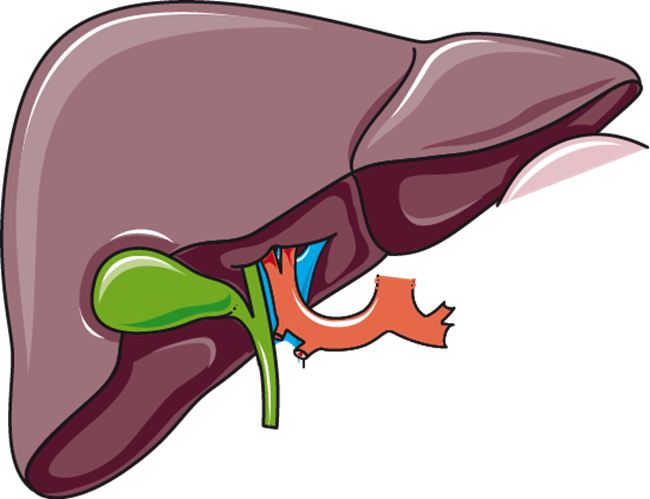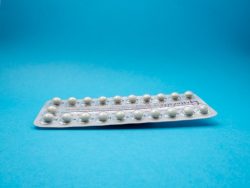This time of year, the holiday season, can be a time of overindulgence for many of us. And how can we talk about overindulgence without taking a look at the liver? To say the liver is important is an understatement. It is the body’s largest gland and while estimates of the number of functions of the liver vary, many textbooks generally cite around 500. Nearly everything we ingest, from drugs and alcohol to vitamins and nutrients, is metabolized by the liver. The vital role it plays in the functioning of our bodies makes the testimony from the 1970 Nelson Pill Hearings about the effects of oral contraceptives on the liver that much scarier.
Research Presented at the Nelson Pill Hearings
Dr. Victor Wynn was one of the first physicians to testify about the effects of hormonal birth control on the liver.
On page 6341 he states, “if you will take cells out of the liver and examine them under the electromicroscope of women taking oral contraceptive medication, you will find some extraordinary changes.” Of these and other changes caused by the pill, he says: “When I say these changes occur, I mean they occur in everybody, more in some than in others, but no person entirely escapes from the metabolic influence of these compounds. It is merely that some manifest the changes more obviously than others.”
Later to testify was Dr. William Spellacy who was specifically called upon to speak about the metabolic effects on the liver. His testimony about the liver begins, “The biochemical effects of the sex hormones on the liver are legion.” Below is a list of liver functions that, based on the research presented in Dr. Spellacy’s testimony, are altered or impaired (NPH 6427):
- Lowering of total plasma protein level
- Decrease in the albumin and gamma globulin and increases in other fractions
- Tests may be abnormal in women on oral contraceptives without disease being present
- Estrogen (including that in oral contraceptives) interferes with liver function and varies with dosage
- Some women taking oral contraceptives have abnormally high blood bilirubin levels
- 1/3 of women who have jaundice on oral contraceptives will get it when pregnant
- Discontinuation of oral contraceptives “cures” jaundice
He summed up his thoughts on the liver damage caused by hormonal birth control:
“The immediate effects include the alteration of several of the laboratory tests used in medical diagnoses. Aggravation of existing liver disease, if present, to the point where jaundice may be seen has also been shown. There is no answer to the query of will permanent liver damage result from the use of the oral contraceptives.”
The honorary Chairman of the Population Crisis Committee, a “pro-pill” organization focused on population control added his two cents about the effects of oral contraceptives on the women using them. “While metabolic alterations affecting the liver and other organs do result from use of the pill, there is no evidence at this time that they pose serious hazards to health;” General William Draper, Page 6705.
Of course, we shouldn’t assume that just because a medication causes a “legion” of biochemical effects on the livers of otherwise healthy women that there will be any lasting problems, right?
Research Since the Hearings
“Women more commonly present with acute liver failure, autoimmune hepatitis, benign liver lesions, primary biliary cirrhosis, and toxin-mediated hepatotoxicity,” according to a 2013 article in Gastroenterology and Hepatology.
Like I mentioned in my piece about rheumatoid arthritis, whenever a health issue affects women disproportionately, there is often a connection with hormonal birth control. While this study doesn’t specifically mention that, it does call for further studies assess the role of sex hormones and other behaviors on liver problems in women.
These connections were well-documented at the 1970 Nelson Pill Hearings but the subsequent research gets more confusing.
Timeline of Liver Research
1980: Lancet published an article showing the connection between malignant liver tumors and women using oral contraceptives.
1989: The British Journal of Cancer found “confirmation in this population of the association between oral contraceptives and hepatocellular carcinoma” and “the relative risk was significantly elevated in long-term users [of oral contraceptives].”
1992: “This study, the largest to date, adds to the number of investigations demonstrating an increased risk of primary liver cancer with use, particularly long-term use, of oral contraceptives.”
2006: “Long-term use of oral contraceptives (OCs) and anabolic androgenic steroids (AASs) can induce both benign (hemangioma, adenoma, and focal nodular hyperplasia [FNH]) and malignant (hepatocellular carcinoma [HCC]) hepatocellular tumors.”
Yet a 2015 meta-analysis concluded that “oral contraceptive use was not positively associated with the risk of liver cancer.” However, the analysis also conceded that “a linear relationship between oral contraceptives use and liver cancer risk was found.” And the authors noted the need for further research into specific formulations of oral contraceptives and the duration of usage.
It makes you wonder how we went from pretty convincing and highly damning connections between oral contraceptives and liver cancer to no positive association at all. Did all the scientists from the 1960s to 2006 get it wrong? Or is something else going on here?
What About the Gallbladder?
Perhaps we can look at the liver’s little buddy, the gallbladder, for some more information. The two are intimately connected in that the liver is constantly making bile and sending it to the gallbladder for storage and dispensation. Like problems with the liver, women are more likely to develop gallstones than men. According to the National Institute of Diabetes and Digestive and Kidney Diseases, “Extra estrogen can increase cholesterol levels in bile and decrease gallbladder contractions, which may cause gallstones to form. Women may have extra estrogen due to pregnancy, hormone replacement therapy, or birth control pills.”
This was proven shortly after the Nelson Pill Hearings. According to the revised edition of The Doctors’ Case Against The Pill by Barbara Seaman:
“The Pill also has serious adverse effects on the gallbladder, and women who take the Pill face an increased risk of someday facing surgery for gallstones. Pill use causes higher levels of cholesterol saturation in the bile, according to a study reported in the New England Journal of Medicine in 1976. This high level of fate in the bile is considered ‘an early chemical stage of gallstone disease,” according to Dr. Donald Small of the Boston University School of Medicine… The risk of gallbladder disease rises with the length of time a woman has been on the Pill… In some studies, Pill users are two and a half times as likely to suffer from gallstones as comparable women.”
A meta-analysis conducted in 1993 found “Oral contraceptive use is associated with a slightly and transiently increased rate of gallbladder disease” and “Considering…the rapidly changing formulas of oral contraceptives, the authors suggest that the safety of new oral contraceptives be evaluated by studying bile saturation and biliary function rather than by waiting for gallbladder disease to develop.”
A much more recent study (2011) found that there was even more risk of gallbladder disease with the newer formulations:
- Long-term use of an oral contraceptive is associated with an increased risk of gallbladder disease compared with no use
- There was a small, statistically significant increase in the risk of gallbladder disease associated with the use of desogestrel, drospirenone and norethindrone compared with levonorgestrel
- Both estrogen and progesterone have been shown to increase the risk of gallstones
- Estrogen has been shown to increase cholesterol production in the liver, with excess amounts precipitating in bile and leading to the formation of gallstones
- Progesterone has been shown to decrease gall-bladder motility, which impedes bile flow and leads to gallstone formation
The gallbladder shows us that these hormones are damaging the body.
What Now?
So what do you do when you have a gallbladder that’s not functioning properly? The current practice is to take it out! Of course, removing the gallbladder is not the quick fix many think it is and often leads to other health complications like irritable bowel syndrome, acid reflux, and Sphincter of Oddi Dysfunction.
What about when your liver isn’t functioning properly? That’s not as simple. You can’t just take a liver out. How can the gallbladder, an organ so fundamentally connected to the liver, experience drastic and dangerous changes from hormonal birth control but the liver is supposedly unaffected? Have we researched ourselves out of that problem by declaring that it isn’t a problem? Has there been some spin-doctoring going on when it comes to the liver?
As Dr. Wynn said at the hearings, “There are more than 50 ways in which the metabolic functions of the body are modified, and to say therefore that normal physiological function has been demonstrated in the years of oral contraception is to overlook a very large amount of information.”
I think a very large amount of information has indeed been overlooked.
We Need Your Help
More people than ever are reading Hormones Matter, a testament to the need for independent voices in health and medicine. We are not funded and accept limited advertising. Unlike many health sites, we don’t force you to purchase a subscription. We believe health information should be open to all. If you read Hormones Matter, like it, please help support it. Contribute now.
Yes, I would like to support Hormones Matter.
Laboratoires Servier, CC BY-SA 3.0, via Wikimedia Commons
This article was first published December 15, 2016.















I wanted to share for other women who may be going through the same thing, you are not crazy to be suspecting your birth control.
I have always had a healthy, active lifestyle, my bmi is normal too.
As soon as I first started using birth control at age 19 (nexplanon implant) I started getting frequent horrendous upper right quadrant pain. For 6 years doctors tried to pass it off as IBS, until my gallbladder went septic and nearly killed me. My gallbladder was removed when I was only 25 once I was stable enough to undergo general anaesthetic.
A year later, I started getting similar pains again. This time, it was abcesses on my liver. Afterwards I was diagnosed with primary biliary cholangitis, although the doctors were all perplexed at my age and unsure that that’s what it truly was.
At the age of 30 a lump has been found on my liver, and I’m awaiting to see what it is.
All that time in between 3 pregnancies, I was using nexplanon or the progesterone only pill. After years of my own research, I am convinced it is the worst contributer to ny gallbladder and liver disease, but my concerns were always dismissed by health care professionals.
I made the decision to cease all hormonal birth control. I now use an app to help with cues from basal body temperature/cervical fluid and I use a diaphragm on fertile days.
I wish more health professionals would listen to my concerns and that more scientists would research into this. It’s good for women to have hormonal contraception available if a pregnancy would cause them absolute devastation, as it helps avoid abortions in those cases, however women deserve to know ALL of the facts and information about what they are putting into their bodies, and that the contraception actually shuts off your body’s natural hormone production entirely, and that hormones affect every single function in your body, including your brain, not just ovulation/menstruation.
I was taking BC for 6 years after I had my son. I went a sonar and they discovered a 2cm gallstone. I have since stopped the BC 6 months ago. Now not sure what other BC pills do not cause this problem.
Came across this site while googling water contamination. I offer the following for those who may be struggling. I am currently beyond the age of childbearing but over a period of 20+ years , my husband and I used Natural Family Planning. You chart mutual fertility using signs and symptoms (temperature and cervical mucus). Abstinence during the fertile period can be challenging but then you have a little honeymoon each month. As a woman, I felt that my body was not being thwarted or poisoned. My cycles and my husband ‘s fertility were acknowledged and respected. We used the method recommended by the Couple to Couple League. They now have an online course and an app. Other methods are out there but the sympto-thermal method offered by CVS is very thorough and researched. We started using the method after our first child and had two more planned children.
Thank you for your input! My fiancè has suffereed from liver/gallbladder issues for a couple of months now. I started thinking of when she started her BC and when her problems started occurring and the problems started just after she started the BC. So I Googled it andbit took me to this sitree and I seen your remark! Your post says it was posted 10-19-19 at 8:47pm. Weird though because it is only 8:30pm now on 10-19-19, LOL. So I did I see this in the future.
I’m here reading because I started the pill a year and a half ago and had my gallbladder removed about 4 months in and then just this year was admitted to the hospital with my liver enzymes testing at 1000! Itching all over, severely nauseous and fatigued. The doctors did every test they could think of and I was totally convinced it was my birth control. The ER doctors dismissed it and the gastro doctor still is, but I took it upon myself to research this and made and appointment with my OBGYN who said it very well could be the BC and took me off immediately. Now I have a spot on my liver and I was told it looks very coarse like someone with severe liver disease and I have several follow up appointments. Very scary. More people should be aware. Had I not taken matters into my own hands and researched I could be dead.
I found out today that my gallbladder infraction rate was functioning at 18% and the doctor wants to remove it. I would rather not go for surgery if I can repair it. Do you have any suggestions?
[…] https://www.ncbi.nlm.nih.gov/pmc/articles/PMC2247061/ https://www.hormonesmatter.com/birth-control-liver-gallbladder/ https://www.ncbi.nlm.nih.gov/pubmed/2960241 […]